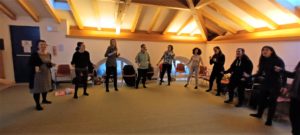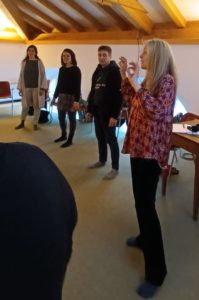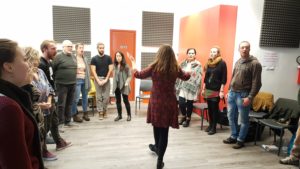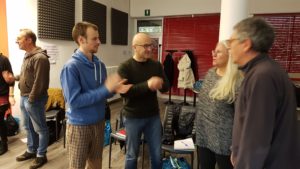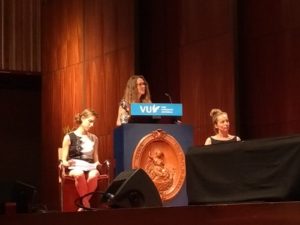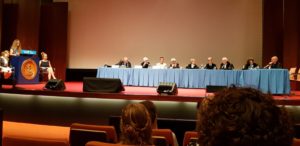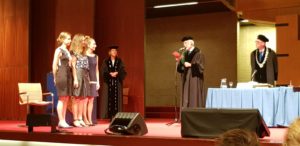Voice Workshops & Presentations Sylka Uhlig
10/11 February 2023; 5/6 May 2018: Trento – Il canto della voce
Experience of Singing & Transfer for Professional Development: Voice Training Program in Music Therapy: IL CANTO DELLA VOCE, Trento, Italy
Il Canto della Voce | Trento | Facebook
14/15/16/February 2020 & 19/20 January 2019
Training: Voice, Singing & Rap in Music Therapy (English); Center for Education (Agenzia di educazione permanente), Bolzano, Italy; Musiktherapie Ausbildung. Registration at www.cesfor.bz.it/wp-content/uploads/2014/03/FLYER-MT-CESFOR-2014.pdf; information email info@cesfor.bz.it
25 June 2019 PhD defence VU University Amsterdam
30 November 2018
Studiedag Stem, Belgische Beroepsvereniging van Muziektherapeuten: http: www.bmtvzw.be/
15 November 2018
Miracles of Music: De dag van de muziektherapie, VU Amsterdam: https://miraclesofmusic.nl/congres/
30/31 August 2018/19
SUMMERSCHOOL CLINICAL RESEARCH METHODS IN MUSIC SCIENCES AND INTERVENTIONS, VU Amsterdam: https://crmmusic2018.wordpress.com/program
_____________________________________________________________
Related Resources
Video – Vocal improvisation: Bobby McFerrin sings for scientists
References
Adamek, K. (2008). Singen als Lebenshilfe. Zu Empirie und Theorie von Alltagsbewältigung (4. Aufl.). Waxmann.
Austin, D. (2009) The Theory and Practice of Vocal Psychotherapy; Songs of the Self, JKP. GB.
Bradt, J., Norris, M., Shim, M., Gracely, E. J., & Gerrity, P. (2016). Vocal music therapy for chronic pain management in inner-city African Americans: A mixed methods feasibility study. Journal of Music Therapy, 53(2), 178- 206. https://doi.org/10.1093/jmt/thw004
Clements-Cortés, A. (2017). Singing and Vocal Interventions in Palliative and Cancer Care: Music Therapists‘ Perceptions of Usage. Journal of Music Therapy, 54(3), 336-361. https://doi.org/10.1093/jmt/thx010
Colwell, C. M., & Fiore, J. (2020). Feasibility of patient-created Orff chant as a music-based intervention in supportive cancer care. Journal of Music Therapy, 57(4), e1-e31.
Dakovanou, X. (2020). Vocal-Development Music Therapy (Vocal-Dev) and early symbolization in adult psychiatric patients. Philosophy, Art, Therapy[1]PATh, 1. https://hilab.di.iono.gr/path
Fancourt, D., & Perkins, R. (2018). Effect of singing interventions on symptoms of postnatal depression: Three-arm randomised controlled trial. The British Journal of Psychiatry, 212(2), 119-121.
Han, E., Yun, J., Chong, H., & Choi, K.-G. (2018). Individual Therapeutic Singing Program for Vocal Quality and Depression in Parkinson’s Disease. Journal of Movment Disorders, 11(3), 121-128. https://doi.org/10.14802 /jmd.17078
Hoog Antink, M. T., Weymann, E., & Ohls, I. (2019). Die Stimme als Selbstrepräsentanz. Musiktherapeutische Umschau, 40(2), 113-127. https://doi.org/10.13109/muum.2019.40.2.113
Low, M., Lacson, C., Fengqing, Z., Kesslick, A., & Bradt, J. (2020). Vocal Music Therapy for Chronic Pain: A Mixed Methods Feasibility Study. The Journal of Alternative and Complementary Medicine 26(2), 113-122. https://doi.org/10.1089/acm.2019.0249
Meashey, K. (2020). The Use of Voice in Music Therapy. Barcelona Publishers.
Nakkach & Carpenter (2012) Free Your Voice: Awaken to Life Through Singing. Sounds True Publisher.
Palazzi, A., Filippa, M., Meschini, R., & Piccinini, C. A. (2021). Music therapy enhances preterm infant’s signs of engagement and sustains maternal 72 singing in the NICU. Infant Behavior & Development, 64.
Reilly, N., Turner, G., Taouk, J., & Austin, M.-P. (2019). ‘Singing with your baby’: An evaluation of group singing sessions for women admitted to a specialist mother-baby unit. Archives of Women’s Mental Health, 22(1), 123-127.
Rittner, S. (2008). Der Wirkfaktor Stimme in der Psychotherapie/in der Musiktherapie. Musiktherapeutische Umschau 29(1), 201-220. https://doi.org/10.13109/muum.2008.29.3.201
Särkämö, T., Laitinen, S., Numminen, A., Kurki, M., Johnson, J. K., & Rantanen, P. (2016b). Pattern of emotional benefits induced by regular singing and music listening in dementia. Journal of the American Geriatrics Society, 64(2), 439-440.
Schwartz, E., Boyle, S., & Engen, R. (2018). Functional Voice Skills for Music Therapists. Barcelona Publishers
Sokolov, L. (2020). Embodied Voice Work: Beyond Singing. Barcelona Publishers.
Stegemöller, E., Radig, H., Hibbing, P., Wingate, J., & Sapienza, C. (2017). Effects of singing on voice, respiratory control and quality of life in persons with Parkinson’s Disease. Disability and Rehabilitation 39(6), 594-600. https://doi.org/10.3109/09638288.201
Storm, S. (2013). Research into the Development of Voice Assessment in Music Therapy [Dissertation]. Aalborg University.
Wünnenberg, E. (2021). Singende Krankenhäuser. In H.-H. Decker-Voigt, & E. Weymann (Hrsg.), Lexikon Musiktherapie (3. vollst. überarb. und erw. Aufl., S. 582-587). Hogrefe.
___________________________________________________________________________
Personal references of participants of workshops:
Workshop Singing & Transfer for Professional Development at Voice Training Program in Music Therapy: IL CANTO DELLA VOCE, Trento, Italy, 2023:
‘The connection between theory and practise was excellent balanced. The exercises were easy to practice and could be directly applied during the workshop. The process of understanding the theoretical contents and explanations about authentic sounds and their meaning in therapy was completed by the personal experiences of the direct moment. Partner-work deepened those personal and professional experiences by applying various clinical examples. While working with solo- as well as group-settings, the individual involvements were divers and depended at the moment of the experiences: feeling safe, keeping control, letting go, facing loneliness or feeling support… The workshop was a wonderful and very satisfying practice of vocal work for several music therapy settings.’
Participants of Training Rap & Singing in Music Therapy, Bolzano, Italy 2014/2015:
‘Sylka Uhlig is a bright spirit. She teaches, lives and moves with a great passion and enthusiasm. Her knowledge, experience and heart make her work so successful.” Marianne Schinaia at LinkedIn.
A. The workshop was very interesting and complete, both in the overview of voicework in music therapy, and in the in depth work with the “rap” instrument. Theory and practice were very well balanced and Sylka was able to create a positive and welcoming environment. I really appreciated the possibility to express myself in a creative way together with the group, discovering how the creation of rap lyrics helps to bring even important personal themes to the surface. All this in the freedom and pleasure of body engagement, rhythmical enhancement and vocal expression. A big thanks to Sylka for this precious workshop!
B. Workshop was light and fun but also it forced me to work a lot on myself. To write a rap that makes sense and that really has something to say is not easy. The method Sylka explained is complex, articulated and complete. It forces you (even if you don’t want to) to look inside yourself and deeply analyze the feelings you have about a specific person, event or situation. It was very useful, I acquired precious skills for my music therapy.
C. The workshop was very useful because Sylka focused on skills and practical experience. I particularly appreciated her experiences and research work on voice. It’s a pity her books are not translated. She was very good at understanding the group’s needs and the personal profile of everyone. It would have been good to have more time to complete the rap composed during the last afternoon or to create a new one.
D. Der Workshop hat mir sehr gut gefallen. Denn ausser der technischen Vorschlaege die Du unterbreitet hast, gefaellt mir sehr gut deine “powerfull” Art und das ist toll! Seit laengerem verwende ich immer mehr in der Therapie die Stimme. Dadurch habe ich mit den Behinderten ein besseres Verstaendigungsverhaeltnis gefunden und entwickelt. Ich selbst bezeichne mich als eine rhythmische Person und deshalb arbeite ich auch viel mit Percussion in der Therapie. Den Rap kann ich sicher gut in der Therapie anwenden. Was mir noch sehr gut gefallen hat war das Schreiben von Texten welches die Gefuehlswelt der Person beschreiben kann. Oefters passiert auch das jemand von MT hoert, aber jedoch Angst hat weil er kein Instrument spielen kann. Und gerade mit dem Rhythmus und den Worten, ist es ein guter Mix um etwas auszudruecken. Ausserdem ist es auch eine gute Ergaenzung um nicht nur die Noten niederzuschreiben und zu analysieren die die Person bewegt.
About Sylka Uhlig
Bruun, E. F. (2012). Voicework in music therapy research and practice, edited by Felicity Baker and Sylka Uhlig: London and Philadelphia, Jessica Kingsley, 2011, 367 pp.,£ 29.99 (paperback), ISBN 978-1-84905-165-1. Dramatherapy, 34(2), 109-110.
Molyneux, C. (2011). Voicework in music therapy: Research and practice [Book Review]. New Zealand Journal of Music Therapy, 9, 86.
Rinta, T. (2012). Book Review: Voicework in Music Therapy–Research and Practice. By Felicity Baker and Sylka Uhlig (Eds.), foreword by Diane Austin. London, UK: Jessica Kingsley Publishers, 2011. 368pp.£ 29.99/$49.95 paperback. ISBN: 9781849051651. Psychology of Music, 40(6), 761-764.
Renz, M., Rieger, G., Lahusen, S., Generotzky, C., Schumacher, K., Wosch, T., & Uhlig, S. (2008). Ulrike Linden, Wibke Feenders, Dr. Michael Meusers, Dr. Thomas Ostermann Musiktherapie bei Kindern mit Sprachentwicklungsverzögerung–Zwei Einzelfallstudien aus einer Pilotstudie………………………. 337. Musiktherapeutische Umschau, 29(4), 321-322.
___________________________________________________________________________
Links
Startseite – Deutsche Musiktherapeutische Gesellschaft (musiktherapie.de)
Stichting Muziektherapie Nederland
European Music Therapy Confederation
American Music Therapy Association
World Federation of Music Therapy
Voices: A World Forum for Music Therapy
European Consortium for Arts Therapies Education
Specialists of Voice:
Nicola Oddy www.NicolaOddy.com
Antonella Grusovin www.ilcantodellavoce.com
Fraua Kruse-Zaiss, StimmIMPULS www.stimmimpuls.com
Kate Richards Geller (USA) www.singforyourself.net
Lisa Sokolov, Embodied VoiceWork, NY, USA www.lisasokolov.com
Diane Austin, Clinical Vocal Improvisation, NY, USA www.dianeaustin.com
Silvia Nakkach, Vox Mundi Project, CA, USA www.voxmundiproject.com
Rhiannon, Vocal Improvisation, CA, USA www.rhiannonmusic.com
Navah Tehilla (NL/Israel) www.orbalev.nl
Gülten Uralli (Turkey) www.tumata.com
Annette Cramer (Germany) http://www.musiktherapeutikum.de
Florencia Grasselli (Argentina/Netherlands/Bahrain) musictherapybahrain.com
___________________________________________________________________________
“De kunsten geven toegang tot onze diepste emoties, ze raken preverbale als ook hoogabstracte perceptie. Ze zijn daarom onlosmakelijk verbonden met onze gezondheid, met fysiek, psychisch, spiritueel en sociaal welzijn. Ze waren eeuwenlang leermeester voor de ontwikkeling van emotionele vaardigheden en humanisme, en ze veroveren deze plek opnieuw zoals beschreven in dit boek” (Uhlig, 2013. In De muzen aan het woord. Birnie en Dirkx. Boekomslag. De ronde Tafel)
